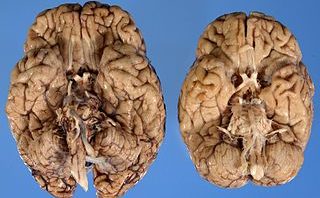In Neurochemistry class, we talked about Alzheimer’s Disease, which is one of the most detrimental disorders that someone can experience. We talked about how there are a lot of different theories for the etiology of the disorder (i.e. genetics) and other associated factors.
We learned about Amyloid-Beta plaques and oligomers, which are basically just strands of misfolded/dysfunctional proteins that disrupt neuron signaling, eventually leading to cell death and, moreover, cognitive decline.

One of the most interesting things that I learned, however, was the association between Alzheimer’s Disorder and Type II Diabetes. Current research is explaining how LDL, or “bad cholesterol,” is linked with Alzheimer’s in that it can lead to the increase in AB build-up in the brain which, as mentioned before, is also concomitant with AD.
In a review done in 2013, they mentioned multiple studies that have linked Type II Diabetes to Alzhiemer’s, and how that association has increased substantially in the last few years. It is estimated that it is because of the Westernized lifestyle of high-caloric food intake with a lack of exercise.
The study also mentioned how they have found that both AD and Type II Diabetes have insulin resistance, which results in an increased amount of blood sugar and, therefore, a higher potential for AB plaques and cell death.
Insulin plays a very important role in metabolism and protein synthesis. Basically, we need this hormone to form memories and process our food. Without it, we would experience cognitive impairments such as memory loss.
Current research is showing promise for insulin treatment and the slowing of Alzheimer’s symptomology, although more research is needed to confirm this hypothesis.

The take-home message that I absorbed through our last Neurochemistry class was that eating healthy and exercising does more than just help you lose weight. There is a substantial amount of supporting evidence that eating right and working out can lead to less “bad cholesterol” build-up, and decrease your risk for Type II Diabetes and, therefore, potentially decreasing your risk for Alzheimer’s disease.
Again, more research is needed to fully understand how to fully prevent this order, but I now know to eat more apples and walk to class more than I currently do.
Diabetes and Alzheimer’s: Eating Healthy Results in More Than Just Weight Loss
